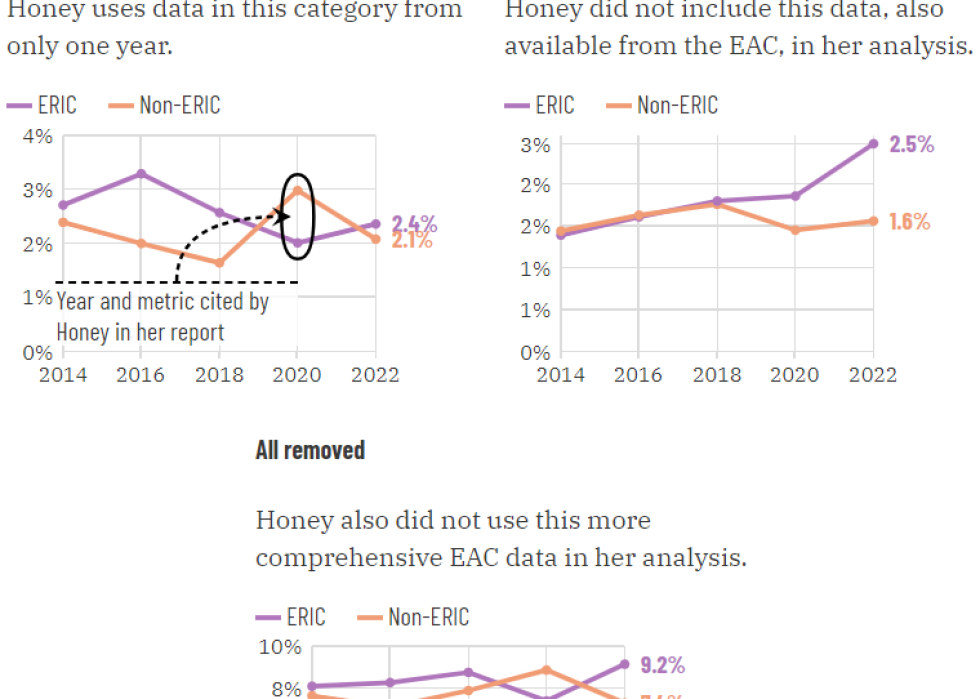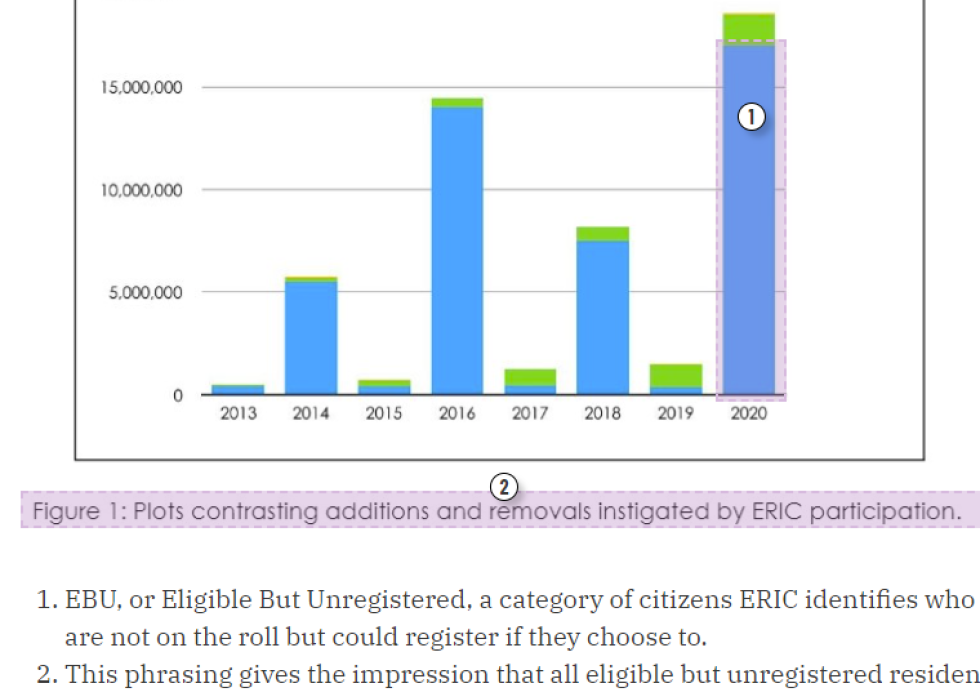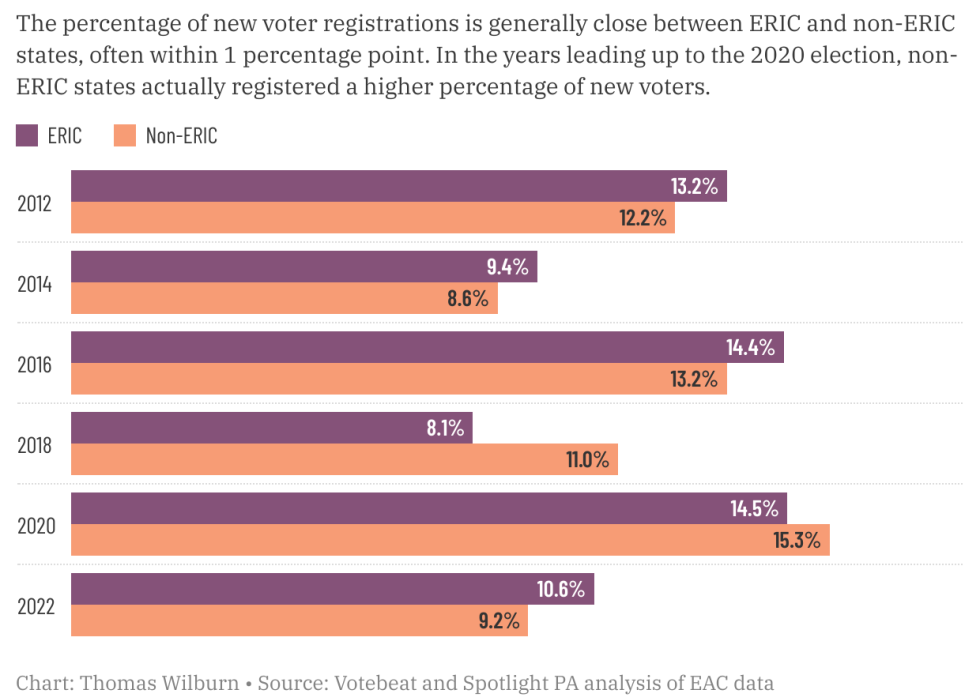This Pa. activist is the source of false and flawed election claims gaining traction across the country

Asked to explain her selective use of data, Honey did not respond to some questions and offered answers to others that contradict the logic of her analysis. For example, asked to explain why she only used a single metric from one year, Honey said in an email that it would be inappropriate to analyze one of the other categories — removal of voters who died — in state-to-state comparisons, since some states, like Pennsylvania, do not use ERIC's death data. But Honey's analysis has the same flaw, as not all ERIC member states use ERIC's moved-voter data uniformly, either.
Honey did not address why she only analyzed the EAC's data from one year, when four were available at the time she published her report.
Elsewhere in the report, Honey claims that the outreach to eligible but unregistered residents, or EBUs, that ERIC requires member states to conduct "results in significant swelling of voter rolls," and that "EBU additions consistently exceed suggested removals by ten times."
But available data doesn't support Honey's conclusions.
"The report is obsessed with EBUs," Stewart said. "I just take, overall, the report as part of building the case that ERIC is this left wing organization that is trying to get Democrats onto the voter rolls."
To conclude additions exceed removals by "ten times," Honey shows a graph of data from ERIC's website. The wording of the title of the graph calls these "additions and removals instigated by ERIC participation," as though all of the numbers displayed are actual voters removed from or added to rolls. But ERIC only supplies information about voters who may need to be removed or are eligible to register to vote — state and county election offices determine which are valid and make any changes themselves. In the case of eligible but unregistered voters, the state simply sends a mailer to the identified person informing them of their eligibility, and the voter must take action from there. Honey acknowledges elsewhere in the report that removal and eligible-voter data ERIC provides to states are merely "suggest[ions]."

Her graph also leaves out two other categories of ERIC's list maintenance recommendations to states. In reality, they've recommended roughly 41 million records be updated and identified roughly 57 million voters who may be eligible.
Votebeat performed a more accurate analysis of ERIC's effect on voter roll additions, using data showing net changes to voter rolls, rather than the number of people who were sent mail.
The EAC's data — which Honey uses elsewhere in her report, though not for this analysis — shows that there is typically less than 1 percentage point of difference between ERIC and non-ERIC states when it comes to registering new voters.

The percentage of new voter registrations is generally close between ERIC and non-ERIC states, often within 1 percentage point. In the years leading up to the 2020 election, non-ERIC states actually registered a higher percentage of new voters.
This figure aligns with academic research on the topic. A study of Pennsylvania's ERIC mailings, published in 2020, found they resulted in only a 1 percentage point increase in registration.
Elsewhere, Honey's report relies on real data to make inaccurate conclusions or omits relevant and readily available context.
For instance, she accurately states that Pennsylvania's and Michigan's secretaries of state received voter outreach grants from nonprofits dispersing money from Facebook founder Mark Zuckerberg and his wife, Priscilla Chan. Honey then incorrectly claims the grants were given to those states "in order to gain access to data needed to inflate the Democrat voter rolls and drive Democrat turnout." Honey did not respond to a request to provide evidence of that claim.
The portion of Pennsylvania voters registered as Democrats went down in 2020, as it has every year for more than a decade. Michigan voters do not register by party, so there are no "Democrat voter rolls" there. And a recent study from data scientists at the University of California Los Angeles found that the areas that received grants funded by Zuckerberg saw less than a 0.13 percentage point increase in voter turnout — ultimately significantly fewer votes than would be needed to swing the election even if they all had voted for Democratic candidate Joe Biden.
Honey also leaves out important context. For example, she quotes a 2021 Wisconsin Legislative Audit Bureau report which found many duplicate and erroneous voter registrations in the file ERIC sent to that state for voters who should potentially be removed.
Honey quotes this accurately but leaves out other parts of the report that reflect positively on ERIC, such as the state elections office saying ERIC does a better job "identifying individuals whose voter registration records may need to be inactivated or who may have more than one active voter registration record" than it does. Among its conclusions, the report says the state's voter rolls would be more accurate if it used ERIC's data more often.
Honey said the issues addressed by the Wisconsin agency were "very different things" than what she investigated in her report, but did not elaborate on why she didn't include the positive aspects.
Honey's claims gain traction
Despite the flaws in Honey's report, it quickly gained traction, making its way across conservative media and into the hands of influential politicians and officials.
"Thank you for reading through this information!" a local Virginia GOP committeewoman wrote about Honey's report in a March 2023 email to a state representative, expressing "hope" it would be shared with the Virginia state elections board. It ultimately was.
Records obtained by Documented also show that Honey's influence grew through the help of Mitchell. In June 2022, Mitchell organized the event for secretaries of state in Washington, D.C. Officials from Texas, Wyoming, Louisiana, and West Virginia were scheduled to attend, according to records obtained by Documented, which also show that Mitchell's group paid for a Texas secretary of state official's travel to the event. Records obtained by Votebeat and Spotlight PA show Missouri Secretary of State Jay Ashcroft was out of office that day for an unspecified "meeting in DC." Louisiana announced its official withdrawal from ERIC a month later.
As officials and activists took notice of the report, Honey's work began to be cited by influential outlets and figures in conservative media, including The Federalist.
"Per government watchdog Verity Vote, ERIC doesn't actually clean states' voter rolls, but rather inflates them," the publication wrote in March 2023, using the name of the entity through which Honey puts out her election-related research.
Her work also made appearances in a series of articles critiquing ERIC by Hayden Ludwig, director of policy research at Restoration of America — a conservative Christian non-profit focused on the challenges presented by "the elite," "Marxist neo-liberals" and "Communist China."
And Judicial Watch, an influential conservative legal watchdog group, cited it in a white paper in March 2023. "States that do not participate in ERIC had a higher rate of identifying and removing from voter registration rolls individuals who relocated out of a jurisdiction than ERIC member states," Judicial Watch wrote.
Policymakers took notice of the report as well.
In 2018, Ashcroft, a Republican, said the state's membership in ERIC "will help affirm voters are eligible and registered in the right location, identify potential duplicate registrations and identify unregistered voters so we can help them get registered."
But last February, Honey gave Ashcroft a private presentation on her report, emails obtained by Documented and Votebeat/Spotlight PA show.
A month later, Ashcroft announced Missouri's withdrawal, saying in part that it was because ERIC was "adding names to voter rolls" — language similar to the claims in Honey's report. Missouri's number of registered voters increased by less than two percent in the time it was part of ERIC. The state's Republican state auditor recently criticized Ashcroft for the decision in a report, which cited the benefit of ERIC's data in maintaining accurate voter rolls. Ashcroft did not respond to multiple requests for comment.
Honey's report was not the sole reason any state withdrew from ERIC. No state election official — even those who met with her or received her report and appear to have adopted some of her language — explicitly cited her research. But her report and advocacy appears to have influenced several states.
In January of last year, Devvie Duke, a member of the Texas GOP and an ERIC task force, said in a Zoom meeting that she had lined up ERIC training with Heather Honey "so we can be informed and productive when we're writing." She paused. "Or, going to see our legislators in support of legislation getting rid of ERIC."
State Sen. Bryan Hughes, who wrote the bill that pulled Texas out of ERIC, participated in that meeting, where he was introduced as "a regular" at the task force's sessions.
Duke, who did not respond to a request for comment, is currently running for a seat in the Texas state House. Her campaign material claims that it was "through Devvie's work that Texas terminated its membership" in ERIC, which she called a "liberal voter registration scheme."
In Virginia, Susan Beals — a former Republican state Senate aide and now the commissioner for the state Department of Elections — also received the report last March from a member of the state House, according to an email obtained by Votebeat and Spotlight PA. A letter obtained by Virginia Public Media shows that when Beals withdrew from ERIC, some of her reasoning was worded similarly to the contents of the email. Beals did not respond to a request for an interview.
Internal communications from an election integrity network in North Carolina — obtained by Documented and shared with Votebeat and Spotlight PA — show that Honey met with a group of legislators about a bill to prevent the state from joining ERIC, and also met with at least some of members of the state Senate who would later vote for the measure.
And language mirroring Honey's research has also appeared in the capitol building of her home state, Pennsylvania, where state Sen. Cris Dush (R-Jefferson) said last March that non-ERIC states were doing a better job cleaning voter rolls than ERIC states, though he did not cite any evidence.
Dush did not respond to a request for comment.
Friends in high places, and a new frontier
Honey has certainly been successful in getting her information in front of influential officials in a way her peers have not, forming connections with secretaries of state, their staffs, state lawmakers, U.S. Senate candidates and congressmen. Her influence, therefore, is likely to continue.
For example, she recently gave a talk in Pennsylvania to the Lycoming County Republican Committee, attended by U.S. Rep. Dan Mueser, who called it an "important presentation" on "securing and protecting the voting system." She also appears to have provided draft language for a bill in June 2021 to state Reps. Seth Grove and Russ Diamond, according to records obtained by American Oversight, a left-leaning watchdog group.
Honey also leads a local organization, PA Fair Elections, which hosts weekly Zoom discussions on election issues and organizes activists. Recent meetings have focused on how to advocate post-election hand counts to county commissioners, though some attract public officials, including at least two state representatives, a Commonwealth Court judge, and county commissioners.
Ahead of the 2024 election, her work is expanding beyond ERIC to include research and advocacy about ballots sent to and from voters living overseas, including military voters.
In addition to authoring a report on the subject, which she published in September 2022, she filed a complaint with the Pennsylvania Department of State, with the support of an attorney from the Thomas More Society. It alleged the department was violating federal law by not requiring identification for some overseas voters.
An attorney for Gov. Josh Shapiro's office, who handled the complaint, dismissed it in November, offering that the complaint was more of an objection to federal law rather than an accusation that existing law was being violated. Honey is now appealing that decision to Commonwealth Court.
She's also exporting this advocacy to states outside the commonwealth. In August, she gave a presentation on overseas voters to the Virginia coalition affiliated with Mitchell's election integrity network, according to records reviewed by Documented.
A now-deleted post from the North Carolina–based Asheville Tea Party, whom Honey worked with to contact legislators in that state, shows that she also gave a presentation in April on military and overseas voters at the request of Mitchell.
Meeting notes posted to the Asheville Tea Party's website indicate Honey explained that her concern was that while people assume the ballots are from military voters, most of them come from overseas citizens, many of whom were likely unverified.
"These newer election officials just rubber-stamp them and don't do anything to verify," she said, according to meeting notes. "It's the non-military that we need to really worry about."
Honey's work focused on influencing local election policy also continues.
At the first PA Fair Elections meeting of the year, Honey kicked off the meeting by talking about what changes members needed to push for in their counties, including pressuring election offices to conduct their required post-election audit — a recount of 2% of all ballots — by hand count. It is currently done with a mix of hand counting and machine tabulation.
"There are 104 days till the primary, so these things we are talking about, we are very much hoping to have them in place for the primary so we can work out any kinks," she told the group of roughly four dozen. "If we can roll them out in the primary, we can hopefully make improvements to them by the general."
Methodology: Graphics and data analysis for this story were done using data from the U.S. Election Assistance Commission's Election Administration and Voting Survey. Specifically, state-level data on the number of reported registrations, voting age population, overall removals, removals due to voter death, removals due to voter moving out of jurisdiction, and new valid registrations were extracted from the 2014, 2016, 2018, 2020, and 2022 datasets. EAVS data should be used and viewed with caution, as it is a voluntary survey and often incomplete or inaccurate.
Data on overall removals, removals due to voter death, removals due to voter moving out of jurisdiction, and new valid registrations was then grouped by each state's ERIC membership status for a given report period. Those figures were then divided by the aggregate reported registrations for the group of states. Reported registrations are the actual number of registered voters a given jurisdiction reports in response to the survey. The voting age population is an estimate of the number of persons eligible to vote, based on census data.
Jason Armesto — a reporter for The Daily Progress, a newspaper in Virginia — contributed to this report.
This story was produced by Votebeat and reviewed and distributed by Stacker Media.
